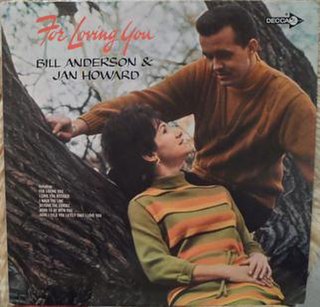
For Loving You is a studio album released by the American country music artists Bill Anderson and Jan Howard in February 1968 on Decca Records. The album was their first collaborative album, setting the trend for a series of studio albums over the next few years. The album's title track, "For Loving You", was the lead single and became a number 1 hit on the Billboard country songs chart.
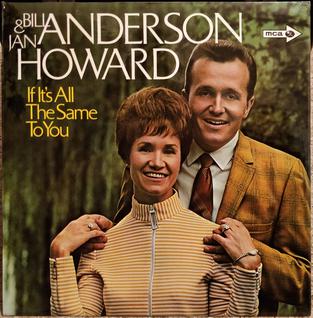
If It's All the Same to You is a studio album by American country music artists Bill Anderson and Jan Howard. The album was released on Decca Records in March 1970 and was produced by Owen Bradley. It was the pair's second collaborative album after several years of performing together on tour and on television. The album's title track became a major hit on the Billboard country chart, reaching the top 10. Additionally, the album itself would reach peak positions on the Billboard country albums chart.

Bill and Jan (Or Jan and Bill) is a studio album released by American country artists Bill Anderson and Jan Howard. It was released in January 1972 on Decca Records and was produced by Owen Bradley. It was the duo's third collaborative album together and featured singles that became hits on the Billboard country chart. The album itself would also chart on the Billboard country albums list in 1972.
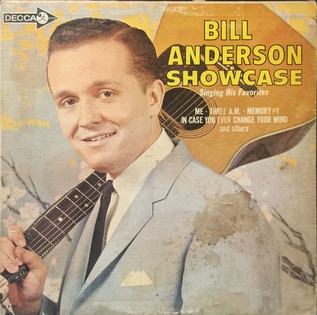
Showcase is a studio album by American country singer-songwriter Bill Anderson. It was released in November 1964 on Decca Records and was produced by Owen Bradley. The album was Anderson's third studio release as a recording artist and second to be released in 1964. It included two singles that became major hits on the Billboard country chart along with subsequent B-sides.

Bright Lights and Country Music is a studio album by Bill Anderson and the Po' Boys. It was released in November 1965 on Decca Records and was produced by Owen Bradley. It was Anderson's first studio album to include dual credit with his band, The Po' Boys. It was his fourth studio album overall. The album included one single release, the title track. This song became a major hit on the Billboard country charts. The album itself also reached charting positions on Billboard shortly after its release.

Get While the Gettin's Good is a studio album by American country singer-songwriter Bill Anderson. It was released in February 1967 on Decca Records and was produced by Owen Bradley. The project was Anderson's sixth studio album and included one single issued. The album itself reached peak positions on the Billboard country albums chart.

I Can Do Nothing Alone is a studio album by American country singer-songwriter Bill Anderson. It was released in June 1967 on Decca Records and was produced by Owen Bradley. It was Anderson's seventh studio record and his first album to consist entirely of gospel music. Although the album did not produce any singles, it made peak positions on the Billboard country albums chart.

Wild Weekend is a studio album by American country singer-songwriter Bill Anderson. It was released in May 1968 on Decca Records and was produced by Owen Bradley. The record was Anderson's ninth studio release to be issued during his recording career. It reached peak positions on the Billboard country albums chart and also produced two singles that became major hits.
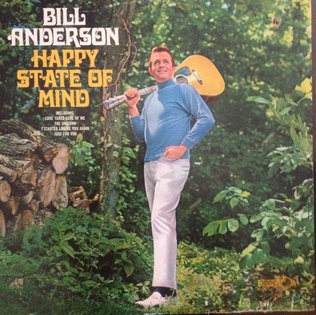
Happy State of Mind is a studio album by American country singer-songwriter Bill Anderson. It was released in September 1968 on Decca Records and was produced by Owen Bradley. Anderson's tenth studio recording, it was also his second studio album released in 1968. Among the songs included on the release was the title track, which became a major hit in both the United States and Canada.

My Life/But You Know I Love You is a studio album by American country singer-songwriter Bill Anderson. It was released in June 1969 on Decca Records and was produced by Owen Bradley. It was Anderson's eleventh studio album to be issued during his musical career. The album's title combines the names of its two singles. Both singles became major hits on the Billboard country chart.
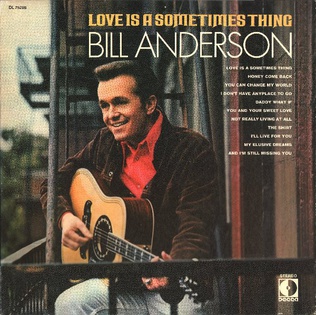
Love Is a Sometimes Thing is a studio album by American country singer-songwriter Bill Anderson. It was released in June 1970 on Decca Records and was produced by Owen Bradley. It was Anderson's fourteenth studio album since signing with the Decca label in 1958. Its only single, the title track, would become a major hit on the Billboard country chart in 1970. The album itself would also reach peak positions on the country albums chart following its release.

Where Have All Our Heroes Gone is a studio album by American country singer-songwriter Bill Anderson. It was released in December 1970 on Decca Records and was produced by Owen Bradley. It was Anderson's fifteenth studio album as a recording artist and his third studio album released in 1970. The album's title track became a major hit on the Billboard country chart. The album itself would also reach peak positions on the Billboard country albums chart.

Bill is a studio album by American country singer-songwriter Bill Anderson. It was released in July 1973 on MCA Records and was produced by Owen Bradley. It was Anderson's first studio album to be released on the MCA label after Decca Records merged with the label. It was also his twenty first studio recording to be released and only album project to be issued in 1973. The album included three singles, two of which became number one hits in either the United States and Canada. The album itself also would reach peak positions on national publication charts.
"Certain" is a song written and first recorded by American country singer-songwriter Bill Anderson. It was released as a single in 1965 via Decca Records and became a major hit.
"I Love You Drops" is a song written and first recorded by American country singer-songwriter Bill Anderson. It was released as a single in 1965 via Decca Records and became a major hit.
"Get While the Gettin's Good" is a song written and first recorded by American country singer-songwriter Bill Anderson. It was released as a single in 1967 via Decca Records and became a major hit.
"Love Is a Sometimes Thing" is a song written by Jan Howard. It was first recorded by American country singer-songwriter Bill Anderson. It was released as a single in 1970 via Decca Records and became a major hit the same year.
"Always Remember" is a song written by Jerry Bradley and Patsy Lawley. It was first recorded by American country singer-songwriter Bill Anderson. It was released as a single in 1971 via Decca Records and became a major hit the same year.
"Golden Guitar" is a song written by Billy Gray and Curtis Leach. It was first recorded by American country singer-songwriter Bill Anderson. It was released as a single in 1965 via Decca Records and became a major hit.

The singles discography of American country singer-songwriter Bill Anderson contains 84 singles, three promotional singles, 6 other charted songs and four music videos. After signing to Decca Records in 1958, Anderson released a series of early singles that became hits, reaching the top ten and 20. This included "That's What It's Like to Be Lonesome" (1958), "The Tip of My Fingers" (1960) and "Po' Folks" (1961). The following year, he reached number one on the Billboard Country and Western Sides chart with "Mama Sang a Song." In 1963, Anderson released his most commercially successful single, "Still." The song was his second number one country single and his first top ten hit on the Billboard Hot 100, climbing to number eight. His follow-up single, "8×10" reached similar crossover success. Anderson released 11 more top ten country hits during the rest of the decade. This included the number one singles "I Get the Fever" (1966) and "My Life " (1969). He also had a number one hit with Jan Howard called "For Loving You" in 1968. Anderson also had top ten hits with "I Love You Drops" (1965), "Happy State of Mind" (1968) and a cover of "But You Know I Love You" (1969).














